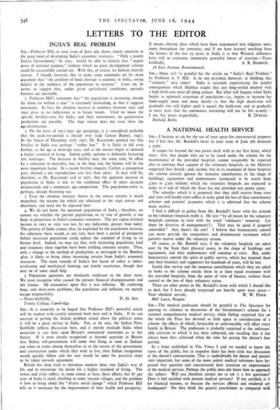A NATIONAL HEALTH SERVICE
Sta,—I hesitate to ask for the use of your space for controversial purposes but I feel that Mr. Rendall's letter in your issue of June 9th demands a reply.
It ranges far beyond the two points dealt with in my first letter, which were: first, that people who are to be taxed under the scheme for the maintenance of the provided hospitals cannot reasonably be expected also to continue their support of the voluntary hospitals, as the Ministry suggested they should ; and, second, that in its treatment of those hospitals the scheme entirely ignores the immense contribution, in the shape of buildings, equipment and endowments (estimated to be worth from £200 to 300 million) which the voluntary hOspit/Is are expected to make to it and of which the State has not provided one penny piece.
The subsidies which it is proposed that they shall receive from rates and taxes will hardly even suffice to make good the loss of their contributory schemes and patients' payments which it is admitted that the scheme must involve.
I find it difficult to gather from Mr. Rendall's letter what his attitude to the voluntary hospitals really is. He says " by all means let the voluntary hospitals continue to exist with the word ' voluntary ' removed. • Let there be diversity of management(?). That may be good if properly controlled." Aye, there's the rub! I believe that bureaucratic control can never provide the sympathetic and disinterested treatment which patients receive under the voluntary system.
Of course, as Mr. Rendall says, if the voluntary hospitals are taken over by the State their physical assets, in the shape of buildings and equipment, and their endowments will continue to exist. - But, under bureaucratic control the spirit of public service, which has inspired them and their founders and supporters for hundreds of years, will be lost.
Surely that service and the immense contribution which they are asked to make to the scheme entitle them to at -least equal treatment with the provided hospitals, from the pqint of view of finance, without State control or the loss of their voluntary status.
There are other points in Mr. Rendall's letter with which I should like to deal, but I have already trespassed too heavily upon your space.—


























 Previous page
Previous page